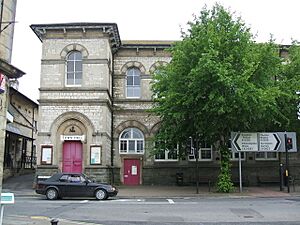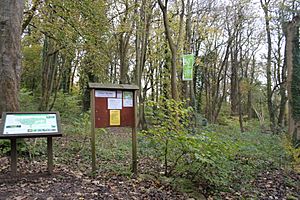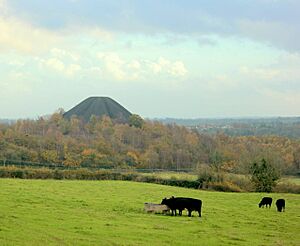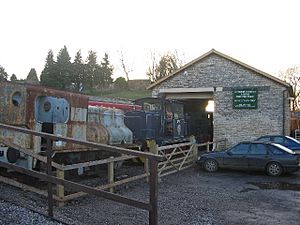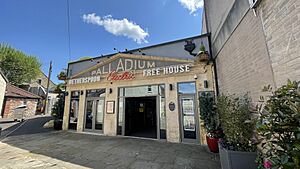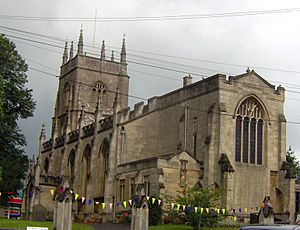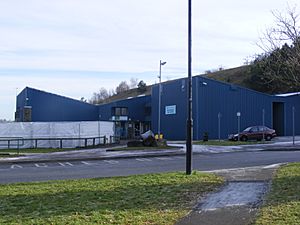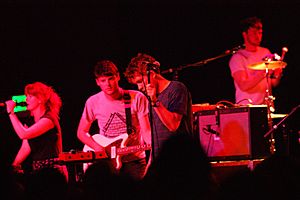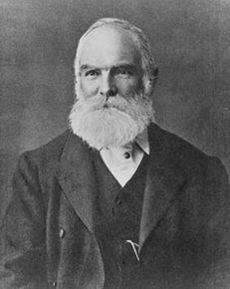Midsomer Norton facts for kids
Quick facts for kids Midsomer Norton |
|
|---|---|
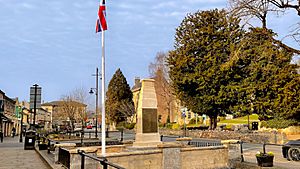 The War memorial with the River Somer running underneath as at 2022. |
|
| Population | 13,000 (2019) |
| OS grid reference | ST664540 |
| Civil parish |
|
| Unitary authority | |
| Ceremonial county | |
| Region | |
| Country | England |
| Sovereign state | United Kingdom |
| Post town | RADSTOCK |
| Postcode district | BA3 |
| Dialling code | 01761 |
| Police | Avon and Somerset |
| Fire | Avon |
| Ambulance | Great Western |
| EU Parliament | South West England |
| UK Parliament |
|
| Website | Midsomer Norton Town Council |
Midsomer Norton /ˈmɪdsʌmər ˈnɔːrtən/ is a town in Bath and North East Somerset, England. It is close to the Mendip Hills. The town is about 16 miles (26 km) south-east of Bristol. Around 13,000 people live here.
Midsomer Norton is known for the River Somer that flows through its town centre. In 2012, the river area was improved with new plants. The town has a long history, with old churches still standing. It grew a lot when coal mining became important in the Somerset coalfield. Coal mines provided many jobs until they closed in the 1960s. The town's two railway stations also closed around that time.
Even after mining ended, Midsomer Norton still had good job opportunities. The printing industry became a big employer. Today, the town offers many shops and services for people living nearby. It also has music venues and sports clubs. There are four primary schools and two large secondary schools. Young people can join groups like Scouts and Guides. Many famous people have lived in Midsomer Norton.
Contents
- History of Midsomer Norton
- How Midsomer Norton is Governed
- Geography and Nature
- Protecting Midsomer Norton from Floods
- Industry and Jobs
- The Railways of Midsomer Norton
- Culture and Fun in Midsomer Norton
- Churches and Communities
- Education in Midsomer Norton
- Media and News
- Sports and Activities
- Notable People from Midsomer Norton
- See also
History of Midsomer Norton
What's in a Name?
The name "Norton" comes from Old English and means 'north enclosure'. The "Midsomer" part was added later, around 1334. Some people think it refers to the town being between two parts of the River Somer. These are the Somer itself and Wellow Brook.
Another idea is that "Midsomer" comes from a festival held in midsummer. This festival honored St. John, the town's patron saint. An old spelling, "Missomerys Norton," might be a clue.
The famous preacher John Wesley once wrote about how bad the roads were. He said the town could only be reached "in midsummer." This suggests the name might also relate to how difficult it was to travel there in other seasons.
'Norton Canonicorum' and the Priory
Sometimes, old church records call the town 'Norton Canonicorum'. This name might come from a local priory (a type of monastery). This priory was connected to Merton Priory in London. This link lasted until 1538, when monasteries were closed down.
Early Times: Prehistory and Roman Era
Evidence shows that people lived in the Midsomer Norton area long ago. There was important activity here during the Mesolithic period (Middle Stone Age). This was focused around a natural spring.
The ancient Fosse Way road, built by the Romans, runs along the south-western edge of the town.
Middle Ages in Midsomer Norton
After the Norman Conquest, William the Conqueror gave land, including Norton, to a bishop named Geoffrey de Montbray. Later, different families owned the manor (a large estate). From 1387, the family of Thomas West, 1st Baron West held the land.
Mining and Landmarks in the 1800s
The Duchy of Cornwall owned most of the mineral rights around Midsomer Norton. Around 1750, small coal mines started to open. Coal mining in the Somerset coalfield helped the town grow into an industrial centre.
Around 1866, a monument called an obelisk was built. It honored the Crimean War and was placed near St Chad's well. A woman named Frederick Stukeley Savage's mother built it to help the poor. The obelisk was on the grounds of Norton House. This large house was built in 1789 by Thomas Savage, who invested in coal mines. The house is gone now, but other parts of its estate can still be seen at Silver Street Nature Reserve.
How Midsomer Norton is Governed
Midsomer Norton has its own Town Council. The town is divided into two areas, called electoral wards. People in these wards elect their local councillors and a Mayor.
The town is part of the Frome and East Somerset constituency. This area elects a Member of Parliament to the House of Commons in the UK Parliament.
The Midsomer Norton Town Hall was built in 1860. It was designed in the Italianate style.
Geography and Nature
Midsomer Norton is in the Mendip Hills. The area has interesting rock formations, including coal layers and sandstone. You can still see signs of the town's industrial past. One example is the conical shape of the Old Mills batch, which is a spoil heap from old mines.
The town sits in two valleys formed by the River Somer and the Wellow Brook. These two rivers join west of Radstock. The combined river then flows east to the River Avon.
On the south side of town is the Silver Street Local Nature Reserve. This reserve is about 2 hectares (5 acres) in size. It was once part of the Norton House estate. The reserve has a broad-leaf woodland with several ponds. There is also a restored 19th-century wellhead that used to supply water to the house. A grassland field is also part of the reserve.
Protecting Midsomer Norton from Floods
For many years, the centre of Midsomer Norton often flooded. The River Somer would rise during heavy rain. This caused flooding in shops, especially where the high street is lowest.
To stop this, a large flood tunnel was built under the high street. It was finished in 1977. This tunnel helps to remove extra water when the town centre is in danger of flooding. A special gate at the top of the high street directs water into the tunnel. The water then flows under the town through a large concrete pipe. It comes out further downstream at Rackvernal. Since this system started, the high street has not flooded.
Even with this success, some areas outside the town are now at higher risk of flooding. This is due to climate change and more houses being built. In 2008, a new monitoring station was set up nearby. It collects data on water levels to help the Environment Agency assess flood risks.
Industry and Jobs
For hundreds of years, coal mining was very important here. Midsomer Norton had several mines, like Old Mills and Norton Hill. However, the coal seams were thin and hard to work. The Radstock Museum remembers the miners who worked in these tough conditions. The arrival of railways, especially the Somerset and Dorset Joint Railway in 1874, made it easier to transport coal out of the area.
The last coal mine in the town, Norton Hill, closed in 1966. Even with modern updates, it became unprofitable due to difficult ground conditions and not enough workers.
After mining declined, Midsomer Norton became a major centre for printing and packaging. About 2,000 people work in this industry locally. Many old mine sites have been developed for light industry.
In recent years, some large local companies have closed or moved away. They often blamed poor transport links. However, the town's business parks are still busy. Midsomer Norton also has national companies, including supermarkets and shops. The town's High Street offers free parking. Many people who live here travel to Bath and Bristol for work and shopping.
The Railways of Midsomer Norton
Midsomer Norton used to have two railway stations. One was on the Somerset and Dorset Railway (S&D), which closed in 1966. The other was at Welton, on the Bristol and North Somerset Railway.
Today, the S&D station, now called Midsomer Norton South, is being restored. Sometimes, steam trains run for about a mile up to Chilcompton Tunnel. The nearest working railway stations are now at Frome and Bath Spa. You can easily reach Bath Spa by bus.
Culture and Fun in Midsomer Norton
Midsomer Norton's railway station is mentioned in a famous song called Slow Train by Michael Flanders and Donald Swann.
The well-known children's author Roald Dahl once sold kerosene in Midsomer Norton in the 1930s. He wrote about this experience in his book Boy: Tales of Childhood. He described it as fun to sell kerosene to "gentle country folk."
The famous writer Evelyn Waugh spent his summer holidays in Midsomer Norton as a boy. He loved the town and described it as his "true home."
The Palladium cinema first opened in 1913. It used to be a brewery. It closed in 1993. In 2015, a company called Wetherspoons bought the building and turned it into a pub, which opened in 2018.
However, cinema came back to Midsomer Norton in 2012. A new community cinema opened at the Town Hall. In 2018, new equipment was installed, bringing new movie releases back to the town.
The town is also mentioned in a song called "The Sheriff of Midsomer Norton" by the Somerset band The Wurzels. Midsomer Norton hosts a special carnival. Since 2014, the carnival procession has returned to the main High Street.
The town has a free newspaper called the Midsomer Norton, Radstock & District Journal. There is also a local radio station, Somer Valley FM, which broadcasts from the town.
In 2016, Midsomer Norton held its first LGBT Pride celebration event.
Music Scene
Midsomer Norton has a lively music scene. The Paradis Palm Court Trio performs free classical concerts every month at the Town Hall. Choir concerts are also popular.
There are several local brass bands. In 2006, Midsomer Norton hosted a big European marching band championship. Bands from all over Europe visited the town.
Churches and Communities
The Old Priory building dates back to the 1600s. Another old building is the Catholic Church of the Holy Ghost. This church was once a 15th-century tithe barn. It was changed into a church by Sir Giles Gilbert Scott.
The Anglican Church of St John the Baptist has a tower from the 15th century. The rest of the church was rebuilt in the 1800s. In the churchyard, there is a memorial to 12 miners who died in 1839.
The Methodist Church on the High Street celebrated its 150th anniversary in 2009. John Wesley, the founder of Methodism, visited the town in 1767. The church building was refurbished in the 1990s.
The Baptist Church meets in Welton. The Salvation Army meets at Stones Cross. There are also active Scout and Guide groups for young people.
Education in Midsomer Norton
Midsomer Norton has several primary schools for children up to age 11. These include Midsomer Norton Primary, St. John's Church of England, Welton Primary, Longvernal Primary, Westfield Primary, and Norton Hill Primary.
There are two large secondary schools: Norton Hill School and Somervale School. Norton Hill School has about 1,400 students aged 11 to 18. It is known for its strengths in technology, maths, computing, and languages. Ofsted, a school inspection body, rated it as "outstanding" in 2007.
Somervale School is an Arts College. In 2008, it was the first school in Bath and North East Somerset to win the Eco-Schools Silver Award. These two schools now work together as the Midsomer Norton Schools Partnership. They also share a sixth form for older students.
The town also has a further education college, the Somer Valley branch of Bath College. It helps over 1,000 full-time students and 5,000 part-time students. The college works with local businesses to provide training programs.
Media and News
Local news and TV shows for Midsomer Norton are provided by BBC West and ITV West Country.
You can listen to local radio stations like BBC Radio Somerset and Somer Valley FM. Somer Valley FM is a community radio station that broadcasts from the town.
The local newspaper is the Midsomer Norton, Radstock & District Journal.
Sports and Activities
The South Wansdyke Leisure Centre offers many activities, including swimming. Norton Hill and Somervale Schools also have sports facilities that local groups use. In 2010, a new skate park and children's play area were built.
There are several football clubs, such as Welton Rovers F.C., Welton Arsenal, and Norton Hill Rangers.
Midsomer Norton has its own Cricket club and a Rugby union team.
In 2002, the World Professional Billiards Championship was held in Midsomer Norton.
Notable People from Midsomer Norton
Many interesting people have connections to Midsomer Norton:
- Peter Alexander (born 1952), an actor who appeared in Emmerdale Farm.
- Joan Beauchamp (1890–1964), a suffragette and co-founder of the Communist Party of Great Britain.
- William Bees (1871–1938), who received the Victoria Cross for bravery in South Africa.
- Chloe Davies (born 1998), a paralympic swimmer.
- Jody Gooding (born 1981), a professional beach volleyball player who lives in the town.
- Anita Harris (born 1942), an actor, singer, and entertainer.
- Denise Johns (born 1978), a professional beach volleyball player for Great Britain.
- Uriah Maggs (c.1828–1913), who founded Maggs Bros Ltd, a long-lasting bookseller.
- Gareth and Kim Paisey from the indie pop band Los Campesinos!.
- Steve Voake, a children's author.
- Arthur Waugh (1866–1943), an author from a famous literary family.
- Tim Weaver, born 1977, a novelist.
- Maisie Williams, born 1997, an actor famous for Game of Thrones.
See also
 In Spanish: Midsomer Norton para niños
In Spanish: Midsomer Norton para niños
 | Madam C. J. Walker |
 | Janet Emerson Bashen |
 | Annie Turnbo Malone |
 | Maggie L. Walker |



